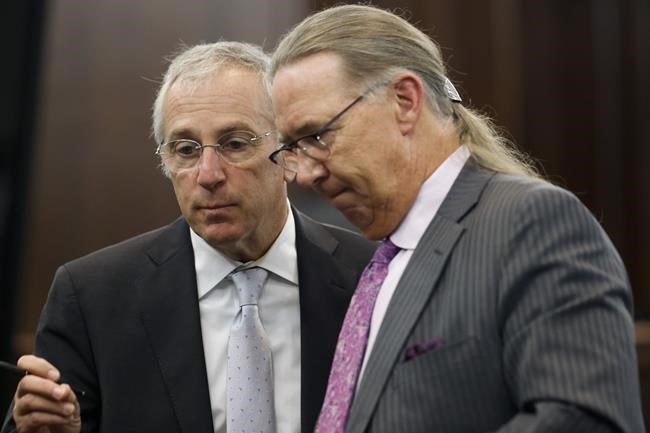BRUNSWICK, Ga. (AP) — The judge in the trial of three white men who chased and killed Ahmaud Arbery declined to override decisions in jury selection Wednesday that left just one Black juror on the final panel of 12, though he agreed with prosecutors that “there appears to be intentional discrimination.”
Prosecutors had asked Superior Court Judge Timothy Walmsley to reinstate eight Black potential jurors, arguing that defense lawyers struck them from the final jury because of their race. The U.S. Supreme Court has held it’s unconstitutional for attorneys during jury selection to strike potential jurors solely based on race or ethnicity.
Walmsley said he was limited in his ability to change the jury’s racial makeup because defense attorneys were able to give nonracial reasons for their decisions to strike the potential Black jurors from the panel.
Race is a central issue in the trial over the 25-year-old Black man's death. Greg McMichael and his adult son, Travis McMichael, armed themselves and pursued Arbery in a pickup truck after they spotted him running in their neighborhood. A neighbor, William “Roddie” Bryan,” joined the chase in his own truck and took cellphone video of Travis McMichael shooting Arbery three times with a shotgun.
After more than two weeks of jury selection, attorneys on both sides Wednesday narrowed a panel of 48 potential jurors to a final jury of 12.
Minutes later, prosecutor Linda Dunikoski challenged defense attorneys' decision to strike eight specific Black jurors, arguing they were cut from the panel because of their race.
Laura Hogue, an attorney for Greg McMichael, denied that the Black panelists' race was considered in decisions to strike them from the jury pool.
“We have a very clear selection process within the defense team, and the issue of race is not one of the factors,” Hogue said. “I can give you a race neutral reason for any one of these.”
She noted one such juror, identified in court as No. 218, had written on her juror questionnaire that Arbery was shot “due to his color” and told attorneys during questioning that she felt the defendants were guilty.
Dunikoski noted that many prospective jurors questioned in open court expressed strong opinions about the case, but all who remained in the pool from which the 12 jurors emerged said they could be impartial and base a verdict solely on the trial evidence.
“The defense has not made a case as to why this juror and her opinions are any different than anyone else, Black or white,” Dunikoski said of No. 218. “She said the same thing almost every other juror said. So many had opinions. And they said they could put them aside.”
In issuing his decision not to change the makeup of the jury, Walmsley said defense attorneys “have been able to explain to the court why besides race those individuals were struck from the panel.”
But, he said, “This court has found there appears to be intentional discrimination in the panel.”
The judge said the jury, along with four alternates, will be seated and sworn in Friday, when opening statements in the trial are expected.
In Glynn County, where Arbery was killed and the trial is being held, Black people account for nearly 27% of the population of 85,000, according to the U.S. Census Bureau. The judge said 25% of the pool from which the final jury was chosen was Black.
Arbery’s death became part of the broader reckoning on racial injustice in the criminal legal system after a string of fatal encounters between Black people and police — George Floyd, Breonna Taylor and Rayshard Brooks, among others.
No one was charged in Arbery’s death until more than two months later, when the video of the shooting leaked online. The Georgia Bureau of Investigation took over the case from local police and soon arrested all three men on charges of murder and other crimes.
Before a final jury is seated, attorneys in a criminal case get to take turns eliminating a significant number of prospective jurors from the final pool, for virtually any reason. The final process of elimination consisted of a bailiff passing a list of the potential jurors back and forth between the prosecutors and the three defense teams. Lawyers used the list to silently choose people to strike from the jury.
Defense attorneys say the McMichaels and Bryan committed no crimes. They say Arbery had been recorded by security cameras inside a nearby house and they suspected him of stealing. Greg McMichael told police his son opened fire in self-defense after Arbery attacked with his fists and grappled for Travis McMichael's shotgun.
Investigators have said Arbery was unarmed and there's no evidence he had stolen anything.
The slaying dominated news coverage and social media feeds in Glynn County, about 70 miles (110 kilometers) south of Savannah. That caused court officials to take extraordinary steps in hopes of seating an impartial jury.
They mailed 1,000 jury duty notices, and nearly 200 people were questioned by the judge and attorneys at the courthouse during jury selection.
Russ Bynum, The Associated Press



